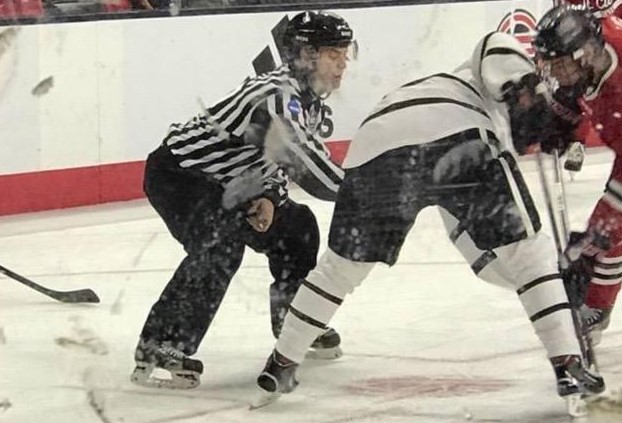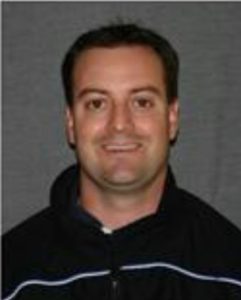
It’s hard to keep a good hockey referee down, especially one who has been calling games since he was nine years old.
If ever there was a sport that finds ways to take people out of action for a while, though, Scott Fitzpatrick had found it.
He has reffed college hockey games for the last 11 years, after also officiating USHL junior games, as his dad did. Scott Fitzpatrick is also a battalion chief with the Omaha Fire Department, but for as much as his main job can put brave folks like him in harm’s way, it was his side job that saw him suffer a serious leg injury Jan. 29 when Omaha hosted North Dakota at Baxter Arena.
Late in the second period, with North Dakota ahead 3-2 in an eventual 6-2 win over the Mavericks, Fitzpatrick was the linesman in charge of dropping the puck for a faceoff in Omaha’s zone, just before a UND power play expired. The Fighting Hawks still had enough time to make use of the man-advantage if they hurried, and amid the commotion, a scary entanglement brought Fitzpatrick down to the ice.
“I was there dropping the puck and braced myself, and a (North Dakota) winger from behind me caught my right skate just right, almost kind of like a slew foot, but I somehow got caught with him, and he kind of kept going and it looks like he got hit from behind, too,” Fitzpatrick said.
“It just kept spinning my right leg all the way around while my left skate was planted in the ice. It’s a freak accident, and I’ve been in that situation (on a faceoff) numerous times but I’ve never had any injury remotely close to this. I’ve been hit with a puck or a stick, something really minor, but nothing like this.”
The play was whistled dead 15 seconds after the faceoff happened. For as long as he was down on the ice, Fitzpatrick was in a no-man’s land with UND racing around looking to double its lead.
“I went down and felt it right away, that something was definitely really bad,” Fitzpatrick said. “I grabbed my leg and was down on the ice, and I thought, ‘Well, I’m not staying on the ice. I’ve got to get up and get off.’
“There’s the adrenaline, but I used my left leg to push myself up and take a stride with my left skate until I realized, ‘That wasn’t very smart. That really hurts.’ I made my way off to where we come on the ice at, that door, and I had them open the door and I took two or three hops on my right leg, and then they blew the whistle as I was getting off.”
Fitzpatrick was quickly placed in a chair and wheeled over to Omaha’s athletic trainers’ room, not far from where he left the ice. A former UNO student himself, Fitzpatrick praised the Mavericks’ training staff for how they took care of him after he went down.
“They called an orthopedic surgeon, a doctor who was actually there on-site watching the game,” he said. “They came down and got me back there and got my skate off and put some cold-water therapy, almost like a brace, on it, but it shoots cold water around it to try and reduce the swelling right away. They also gave me some medicine to help with the pain and the swelling while the doctors looked at it.

“As I’m back there, I’m thinking to myself that I’d never hurt my leg or ankles of any (extent), so I was hoping they’d just tell me it was a high-ankle sprain, and let me take this pain med and put the boot right back on and go back out on the ice and finish, and they all kind of laughed. The orthopedic surgeon was down there at the time, and he’s like, ‘Oh, Scott, it’s broken. You’re done for a while.’”
Fitzpatrick had his wife pick him up to take him to a nearby hospital. Getting a lift from her seemed better than the obvious alternative.
“I didn’t really want to call the (fire department) guys I knew to come get me for a leg injury,” Fitzpatrick said. “The fire department is the same as hockey players — you definitely don’t want to call 911. You want to battle through an injury as much as you can. It’s the same pride both on the ice and in the fire department, so I wanted to take care of it myself as much as I could.”
An X-ray showed that he had suffered a spiral fracture in two places on his left fibula, an avulsion fracture to his left tibia, and two torn ligaments. He underwent outpatient surgery on Feb. 4, when a plate, eight screws and a connective rod were put into place. He is now non weight-bearing on his left leg for six weeks and will be in a boot for four weeks after that. It could take 12 weeks in all for Fitzpatrick to fully recover.
Fitzpatrick’s injury reminded many of fellow NCHC referee Dan Dreger, who was badly injured at Baxter Arena in January 2018 when, standing 10 feet away, he took a slap shot to the face from an Omaha player.
Facial bones on both sides of Dreger’s nose were fractured, and the roof of his mouth was cracked in half lengthwise to the back of his throat.
After five hospital visits to fix the damage, Dreger’s medical bill totaled $89,000. He was on the hook for about $10,000 out-of-pocket despite health insurance from his full-time job as a software engineer in California. At the time, the NCHC didn’t have a secondary insurance policy in place for referees, but that issue has since been addressed.
“I have pretty good insurance anyway through the fire department, but I’ll be able to use (the NCHC’s policy) for whatever my primary insurance doesn’t cover or help out with,” Fitzpatrick said.
“I’ve been pretty lucky, and the fire department has been pretty receptive and dealing with injuries and stuff that happens. They knew that I ref hockey games on the side, so they’re pretty helpful as far as coming back to work and taking time to get healed up, so I have good support from them.”
It wasn’t just people from Fitzpatrick’s day job that came to his aid, however. North Dakota coach Brad Berry and Omaha coach Mike Gabinet both called him the day after his injury, and Gabinet called again this Monday, Feb, 8, to ask how Fitzpatrick was recovering from surgery.
“(Berry and Gabinet) apologized that it happened, and they felt bad and were thinking of me,” Fitzpatrick said. “I thought that was pretty nice of them to reach out, and it shows you the compassion of the hockey community.
“It’s the same with (NCHC commissioner) Josh Fenton, (NCHC director of officiating) Don Adam, (former Omaha coach and current assistant athletic director) Mike Kemp and everybody who reached out either that night or the next day, saying if there was anything they could do to help, they were there. To have everyone reach out, it was a nice touch to show what kind people are in the NCHC.”
Fitzpatrick, 44, plans to be back reffing next season, but he’ll stay busy with his main job as well as hockey in the meantime. His three sons all play, and Fitzpatrick coaches his eldest son’s high school club team in Omaha.
There’s no staying away for someone who has been a hockey referee since his time as a squirt-level player reffing mites — “You could ref the age below you, so back then in the 80s, they didn’t really care how old you were,” Fitzpatrick joked. “Child labor laws didn’t really come into effect too much.” — and he’s not interested in keeping his skates off for longer than necessary.
“It’s a fun way to stay around hockey in a competitive fashion,” Fitzpatrick said. “It’s still good to be out there around everyone, especially at this level. So many of these guys will definitely go on to play at the next level, so to be on the ice with them, it’s a good experience to see that level of hockey here.”
Pod life coming back for playoffs
The NCHC began its pandemic-affected season with a pod format, and the league’s postseason will begin in similar fashion.
League board officials approved on Feb. 4 adjustments to the NCHC’s tournament schedule that will see all games take place March 12-16 at the Ralph Engelstad Arena in Grand Forks, N.D. North Dakota will play host, just as Omaha did when the season began in December for a nearly month-long pod at Baxter Arena.
Whereas the first round of the NCHC tournament is played out in four best-of-three series, the entirety of this year’s tournament will be played under a single-elimination format. March 14 will be an off day at the arena before semifinals take place March 15 and the championship game occurs March 16.
Another change is that there will be no third-place game this year, whereas there was one during the first seven seasons of NCHC tournament play in Minneapolis and St. Paul, Minn.
The NCHC plans to return to its traditional tournament format in 2022 in St. Paul.
Fan attendance for this year’s tournament be permitted on a limited basis, in accordance with university, local and state health guidelines.
Active reported COVID-19 cases in North Dakota are down enormously from November, when the state had more than 10,000 active cases as well as the world’s highest mortality rate at the time.
As of this Wednesday, North Dakota has 759 reported active cases. Grand Forks County has 68 cases, down from a peak of 1,203 in November.


